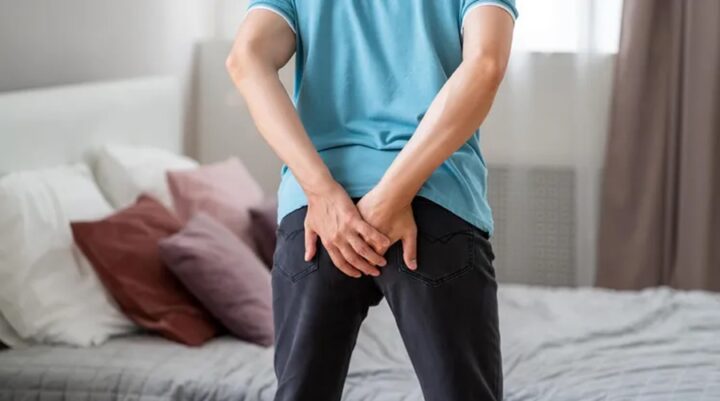
Itchy hemorrhoids: What can help
Itching can be very distressing. Especially when it occurs in places that are unsuitable for uninhibited scratching – such as the anus. Enlarged hemorrhoids are often hidden behind an itchy anal area. Read what can help then.
In the rectum there is a knotty vascular cushion that seals the intestine from the outside: the hemorrhoids. Usually they don’t cause any problems. However, if they are pathologically enlarged, they protrude temporarily or permanently from the anus. Various symptoms can result. These include bleeding, oozing or the feeling of incomplete emptying of the bowel.
Itching on the anus can also be part of it. In fact, itching is often the first symptom (along with blood on the toilet paper) of enlarged hemorrhoids.
Itching hemorrhoids: how does itching occur?
Haemorrhoids are responsible for the fine sealing of the anus: the vascular cushions, together with the sphincters, ensure that no stool escapes when there is vibration – for example when coughing or jumping.
However, if the hemorrhoids are enlarged and protrude from the anus, the fine seal is increasingly disrupted. Then secretion from the rectum can get into the anal region. This irritates the sensitive area of the anus. The result can be an inflammatory reaction that is accompanied by itching, weeping and burning.
What to do if hemorrhoids itch
Various measures can be taken to relieve the tormenting itching caused by enlarged hemorrhoids in the short term. Ointments and creams from the pharmacy may provide temporary relief. The preparations are applied to the irritated body region. Alternatively, there are anal tampons and suppositories that are inserted into the anus and thus act in the rectum.
The preparations usually contain pain-relieving, anti-inflammatory and/or substances that promote wound healing, such as
lidocaine,
Zinc,
aloe vera,
witch hazel or
panthenol.
The active ingredient lidocaine is a local anesthetic. It numbs the irritated area of the skin, temporarily reducing the burning and itching sensation.
Important to know: These measures can possibly relieve the itching. However, they are not a permanent solution and are not sufficient to treat hemorrhoids. If hemorrhoids cause symptoms, sooner or later treatment by a doctor is indicated. Otherwise, those affected risk the hemorrhoids getting worse. The earlier the therapy begins, the easier it is to treat the disease – and once this is eliminated, the itching disappears in the long term.
To what extent ointments, creams & Co. actually relieve itching and burning caused by hemorrhoids has not been conclusively investigated.
Sitz baths for the itch
Some find sitz baths with clear water or bath additives such as witch hazel, chamomile or oak bark to be beneficial for itchy anus. However, whether sitz baths actually help against hemorrhoid symptoms such as itching has not been scientifically proven.
In a sitz bath, only your abdomen and thighs are usually in the water. If you want to use bath additives, you should consider that some ingredients – such as tea tree oil – can also irritate the anal area. This in turn can even promote itching. It is advisable to follow the manufacturer’s instructions and/or seek advice from a pharmacy or doctor’s office before use.
Itching from hemorrhoids: Pay attention to gentle anal hygiene
In order not to further irritate the irritated anal region, thorough but gentle anal hygiene is recommended:
Wash the anal region with lukewarm water daily.
Avoid soaps and aggressive washing lotions.
After using the toilet, gently dab the anus with toilet paper (slightly dampened if necessary) instead of wiping vigorously.
If you want to use moist toilet paper: Pay attention to the ingredients. Many substances contained can irritate the skin.
Itching in the anus: when to see a doctor?
An itchy anus is often due to enlarged hemorrhoids. However, there can be various other causes behind it. They range from excessive hygiene to chronic inflammatory bowel disease and cancer.
If the itching persists and you do not know the cause, you should therefore seek medical advice. If you have other symptoms, you need to see a doctor.
Rapid clarification is necessary if blood can be seen on the toilet paper or on the chair. Although this symptom usually indicates hemorrhoids, sometimes it also indicates colon cancer.
Categories: General
